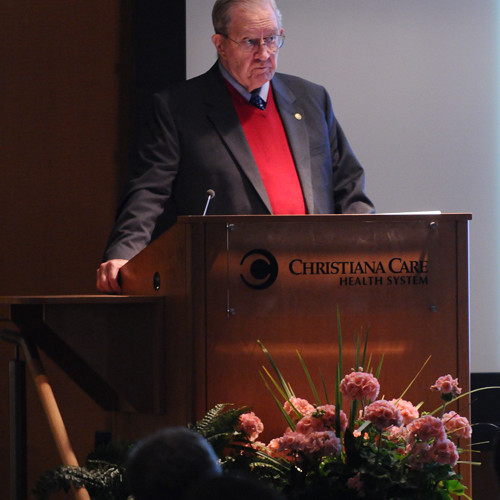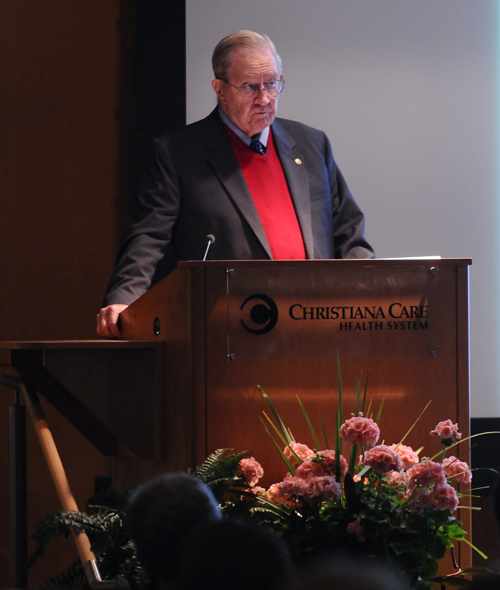50th Holloway Symposium explores past, present and future in fight against infectious diseases


Physicians, infectious-disease specialists, infection-control nurses, pharmacists, microbiologists and others convened May 7 at the John H. Ammon Medical Education Center for the 50th annual William J. Holloway Infectious Disease Symposium, themed, “Holloway 50: Past, Present and Future.”
Program Chair David M. Cohen, M.D., attending physician in Christiana Care’s Section of Infectious Diseases and a member of the system’s HIV Community Program, welcomed attendees and praised the presenters as “the most influential in their areas of study.”
Bennet Lorber, M.D., the Thomas M. Durant Professor of Medicine and professor of microbiology and immunology at the Temple University School of Medicine, explored the past in his introduction to the event by paying tribute to his late friend William J. Holloway, M.D.
“Bill Holloway was an amazingly unique individual in American medicine,” Dr. Lorber said. “He was a community-based practicing doctor who made house calls. He founded and ran a research laboratory that carried out numerous research projects, many dealing with new antimicrobials. When the AIDS epidemic began, Bill leaped into it and became the principal investigator in what became known as the HIV Community Program at Christiana Care and worked a couple days a week in a volunteer fashion, taking care of HIV-infected individuals in a clinic program. Bill was a tireless and selfless community, state and professional leader.”
Dr. Holloway founded the symposium in 1963, a full year before the creation of the Infectious Disease Society of America. “The list of the people who’ve spoken here is a Who’s Who of the history of infectious diseases,” Dr. Lorber added.
The first to join that list this year was Brad Spellberg, M.D., associate professor of medicine at the David Geffen School of Medicine at UCLA, associate medical director of inpatient services at Harbor-UCLA Medical Center and medical director of clinical research solutions at the Los Angeles Biomedical Research Institute. Dr. Spellberg’s presentation, “A Brief History of the Antibiotic,” chronicled the evolution of antibiotics, spanning from evidence of bacterial resistance to antibiotics more than 2 billion years ago to the triumphs and failures of penicillin to today’s need for new, innovative antibiotic solutions.
Dr. Spellberg was followed by David Schlossberg, M.D., professor of medicine at Temple University School of Medicine, associate professor of medicine at the University of Pennsylvania and medical director of the Tuberculosis Control Program for the Philadelphia Department of Public Health. Dr. Schlossberg’s talk examined the history and scope of tuberculosis on a global, national and local scale and its effect on everything from popular culture throughout the years to treatment of HIV and other infectious diseases.
Paul Volberding, M.D., further discussed HIV in his presentation “HIV Care and Research: Remaining Challenges Despite Great Progress.” Professor of medicine at the University of California San Francisco, director of the AIDS Research Institute, co-director of the UCSF-Gladstone Center for Aids Research and director of research of Global Health Sciences, Dr. Volberding tracked the admittedly short story to date of HIV, mapping its modern transportation-powered migration from Southern Africa in the mid-1970s to all corners of the globe by the mid-1980s, and highlighting the advancements and progress to be made in treating the disease.
The keynote address put smallpox under the audience’s microscope and brought to the podium a revered figure in the field, D.A. Henderson, M.D. He was introduced by Omar Khan, M.D., medical director of the Center for Community Health and the Eugene duPont Preventive Medicine & Rehabilitation Institute at Christiana Care, who reminded attendees of the extensive leadership positions Dr. Henderson has held and continues to hold. A resident scholar at the Center for Biosecurity, a Johns Hopkins University distinguished service professor and dean emeritus of the school, Dr. Henderson “holds 17 doctorates … and has received virtually every prestigious public health award in the U.S., including the Presidential Medal of Freedom, the National Medal of Science” and others.
Dr. Henderson’s presentation, “Smallpox Eradication: Miracle or Template for Disease Eradication,” drew on his experience as the director of the World Health Organization’s global smallpox eradication campaign (1966-1977), a remarkable time in which the WHO reduced cases of smallpox from 10 million a year worldwide to virtually zero. In fact, the last reported case occurred in 1978. Dr. Henderson discussed the history and devastating effects of the now extinct disease, calling it “one of the greatest plagues of all time” and pointing to the process of its eradication as a model for eliminating other global health threats.
He was followed by Victor Yu, M.D., professor of medicine at the University of Pittsburgh, who presented “The History of Legionnaires’ Disease: The Inside Story.” Introduced by Anand Panwalker, M.D., associate vice president of medical affairs and chief of the Section of Infectious Diseases at Christiana Care, Dr. Yu traced the history of the disease and discussed — and dispelled — theories behind one of the nation’s most famous outbreaks.
The final presenter was Paul Offit, M.D., chief of the Division of Infectious Diseases and director of the Vaccine Education Center at the Children’s Hospital of Philadelphia. Renowned for his advocacy of childhood vaccinations, Dr. Offit is also the Maurice R. Hilleman Professor of Vaccinology at the University of Pennsylvania School of Medicine. His presentation, “Vaccinated: The True Story of the Father of Modern Vaccines,” discussed Dr. Hilleman’s many pioneering breakthroughs in vaccinations, including his work on vaccinations for influenza, adenovirus, rhinovirus, measles, mumps, chickenpox, hepatitis B, rubella, hepatitis A and more.